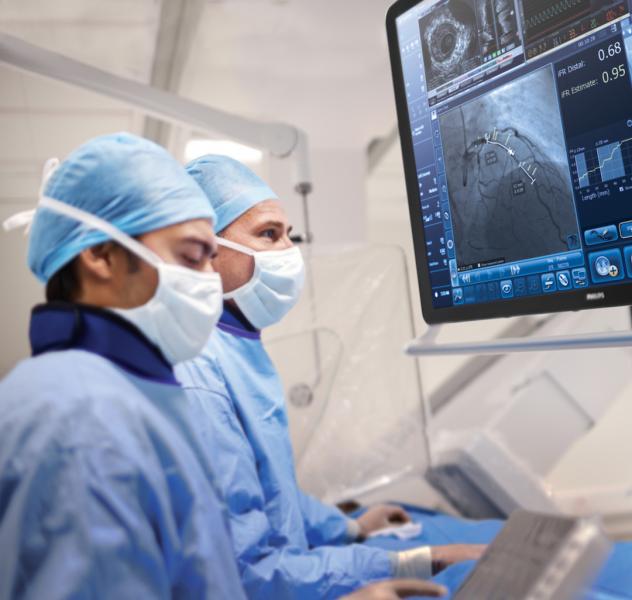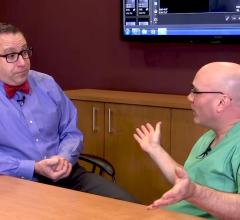Interview with Frederick Masoudi, M.D., FACC, FAHA, professor of cardiology at the University of Colorado Hospital, and ...
Training interventional radiologists to perform endovascular thrombectomies results in positive outcomes for patients experiencing stroke, according to a study presented at the Society of Interventional Radiology Annual Scientific Meeting, March 23-28 in Austin, Texas.1 Expanding access to this treatment provides patients timely access to this gold-standard treatment.
March 27, 2019 —New data from a four-week extension of the landmark PIONEER-HF Trial showed the drug sacubitril ...
Providing exceptional cardiovascular care for patients to achieve the best possible outcomes is the number one goal for ...

The fingerprints of value-added medicine were all over products and works-in-progress on the exhibit floor of the annual ...
March 27. 2019 — A newly released expert consensus statement provides recommendations for the safe and effective ...
March 27, 2019 — The Centers for Medicare and Medicaid Services (CMS) proposed to update its national coverage policy ...
Cardiac positron emission tomography (PET) is growing in popularity among cardiologists because it provides the ability ...
Kim Allan Williams, Sr., M.D., chief of the Division of Cardiology and the James B. Herrick Professor at Rush University ...
Johns Hopkins Medicine now has access to the first Ultra-High Resolution computed tomography (UHR CT) system for research capabilities, delivering twice the resolution of today’s CT systems, thanks to the installation of the Aquilion Precision from Canon Medical Systems USA Inc. The system will be used to expand research capabilities in studies of liver disease and bone loss, as well as investigations in lung disease and coronary artery disease.
Khaldoun Tarakji, M.D., MPH, staff physician in the Section of Electrophysiology and Pacing in the Robert and Suzanne ...
When performing radiofrequency (RF) ablation to treat cardiac arrhythmia, medical professionals must balance the safety ...
March 26, 2019 — A toilet seat-based cardiovascular monitoring system created by a team of Rochester Institute of ...

Right heart failure (RHF) is a syndrome characterized by the inability of the right ventricle (RV) to support optimal ...
March 26, 2019 — Level Ex, creators of medical video games for physicians, expanded into cardiology with the launch of ...
Change Healthcare Cardiology Hemodynamics is an integrated hemodynamic monitoring system for monitoring vital signs and ...
William Pinsky, M.D., a pediatric cardiologist and CEO of the Educational Commission for Foreign Medical Graduates ...
Patients who stopped taking aspirin one month after receiving a stent in the heart’s arteries but continued taking the P2Y12 inhibitor clopidogrel fared significantly better after one year compared with those who followed the standard practice of continuing both medications, according to recent research. Stopping aspirin early was found to be superior in terms of the trial’s primary endpoint, a composite of death from cardiovascular causes, heart attack, clotting near the stent, stroke and major bleeding. The data were presented at the American College of Cardiology’s (ACC) 68th Annual Scientific Session, March 16-18 in New Orleans.
NZ Technologies Inc. announced the first published clinical review on its TIPSO technology’s ability to provide wireless, in-suite control of viewing and manipulation of images to physicians. Published in the peer-reviewed journal Vascular Disease Management, the review tested the technology in 15 consecutive cases. The authors found that the TIPSO AirPad improved workflow in a variety of procedures by minimizing the number of episodes of scrubbing out to view images outside the operating room, thereby reducing procedural time.


 March 28, 2019
March 28, 2019

![New data from a four-week extension of the landmark PIONEER-HF Trial showed the drug sacubitril/valsartan (Entresto) continued to deliver reductions in the heart failure biomarker N-terminal pro–B-type natriuretic peptide (NT-proBNP), an established biomarker for heart failure severity and prognosis.[1] The data was presented as a late-breaker at the American College of Cardiology (ACC) 2019 Annual Scientific Session in March.](/sites/default/files/styles/content_feed_medium/public/Entresto_bottles.jpg?itok=sp56E5GI)













